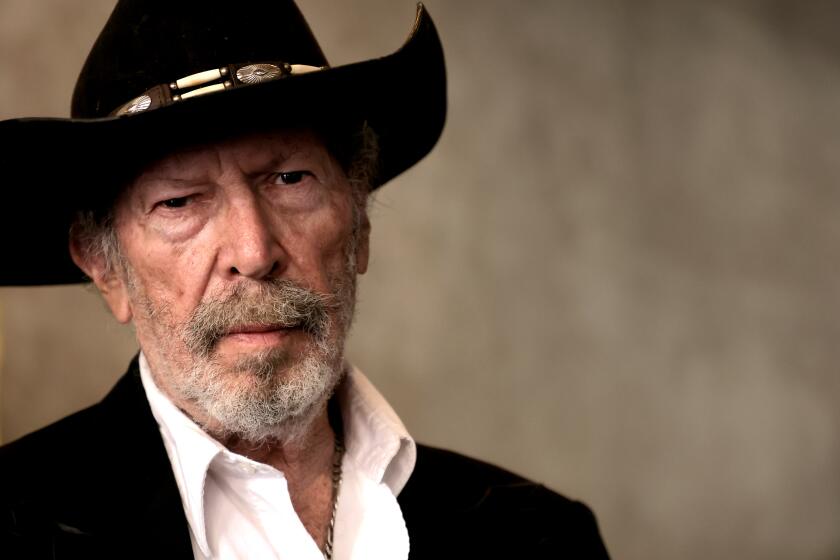Arthur B. Krim; Influential Movie Industry Executive
Arthur B. Krim, a film executive and financier who befriended and influenced such dissimilar Americans as John F. Kennedy and Woody Allen, died Wednesday in his New York City home at 84.
A spokesman said the former chairman of United Artists and founder of Orion Pictures Corp. had been in failing health since heart surgery last year.
In his 1990 book “The Power and the Glitter: The Hollywood Washington Connection,” Los Angeles Times political correspondent Ronald Brownstein noted that it was common to say that if MCA’s Lew Wasserman wasn’t the smartest man in Hollywood, Arthur Krim was.
In New York the order probably would have been reversed.
Physically, the two men had little in common, but mentally they shared a toughness and a commitment to profits and Democratic politics.
They helped raise $10 million for Lyndon Johnson’s 1964 skewering of Barry Goldwater, and Krim was instrumental in setting up a President’s Club for Kennedy where the President had access to funds to help friendly congressmen in their campaigns.
Shortly after learning of Krim’s death, Wasserman said simply that he was “grieving for the loss of an old, dear friend.”
Besides politics and films, Krim was deeply involved in the battle against AIDS. His wife Mathilde is founding chairwoman of the American Foundation for AIDS Research (AMFAR).
In an industry often criticized for the divisiveness among talent and management, Krim was noted at Orion for his support of such long-shot projects as “Amadeus” and “Platoon.”
But by late 1991, despite the successes of “Dances With Wolves” and “The Silence of the Lambs,” Orion had been forced by debt to cut back 250 of its 400 employees. The distributor owed millions of dollars and had filed for bankruptcy. Krim was released from his contract.
Ironically, the company had incurred nearly all its debt before its later triumphs, and the revenue that “Lambs” and “Wolves” generated was too little and too late. It also was said that the company had been undercapitalized from its inception.
Krim’s innovative management techniques first became obvious in the early 1950s when he and another shrewd young lawyer, Robert Benjamin, began attracting independent producers to the troubled United Artists Corp.
They lacked production facilities but instead offered financing and allowed producers to retain ownership of their pictures. In return the producers deferred much of their fees.
Out of that mutually attractive arrangement came “The African Queen” and “High Noon,” among other film classics, and UA returned to a prominence that it hadn’t enjoyed in many years. Some maintained that it became the best showcase for talent since Mary Pickford, Charlie Chaplin and others started the studio after World War I.
By 1966 Krim, Wasserman, Jack Warner and other studio chiefs hired Jack Valenti to advance their common interests as president of the Motion Picture Assn. of America.
But a dozen years later, in a dispute with Transamerica Corp., which owned UA, Krim and his management team moved on.
Krim started Orion, and to his new studio came one of his old friends and best customers at United Artists--Woody Allen.
Many of Allen’s most successful pictures were distributed by Orion, which followed the pattern that Krim had established at UA--leave the talent alone.
For UA Allen had done what many consider his signature films--”Manhattan” and “Annie Hall.” For Orion his string of successes continued with “Crimes and Misdemeanors,” “Radio Days,” “Hannah and Her Sisters,” “The Purple Rose of Cairo” and others.
After he left Orion, Krim became counsel to the prestigious New York law firm of Phillips, Nizer, Benjamin, Krim & Ballon.
Before UA and Orion, Krim had headed Eagle-Lion Film Corp., a subsidiary of Pathe Industries.
Privately, Krim had been an active alumnus and chairman of the Board of Trustees of Columbia University and Columbia Law School, where he graduated with honors in 1932. He was active in the civil rights movement, a member of the board of Occidental Petroleum Corp. and an intimate of its chairman, Armand Hammer, and a director of the American Committee for the Weizmann Institute of Science.
In his book, Brownstein wrote that the low-key executive was a man of “impregnable discretion.”
He also quoted an industry source as saying, “You would never know from seeing Arthur Krim the amount of wealth he had or power or people that he knew.”
Besides his wife, Krim is survived by a daughter, Daphna, and two grandchildren.
More to Read
The biggest entertainment stories
Get our big stories about Hollywood, film, television, music, arts, culture and more right in your inbox as soon as they publish.
You may occasionally receive promotional content from the Los Angeles Times.






